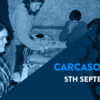
Above: Rajko Vujatovic vs Michal Mazurkiewicz (Round 3)
Diving Chess Makes a Splash at the 2024 World Championships
On Sunday, September 15th, the Leonardo Hotel Spa in central London once again transformed into an aquatic chessboard for the 2024 Diving Chess World Championships. The event brought together players from around the world for a unique fusion of intellect and physical stamina, with participants diving underwater to play chess—where a chess clock is substituted with one’s ability to hold their breath.
For those unfamiliar with Diving Chess, the rules are simple but demanding. Players take turns diving underwater to make a move on a submerged chessboard, using magnetized and weighted pieces to keep everything in place. The catch? You must hold your breath while thinking underwater and make a legal move before resurfacing. Once you come up for air, it’s your opponent’s turn to dive. The pressure to think quickly underwater adds an entirely new dimension to the game, combining strategy with endurance and precision. Additionally, players often find it challenging to sink and control their bodies underwater, adding yet another layer of difficulty.
This year’s competition was particularly exciting, with a mix of familiar faces and new talent making waves. The 2024 tournament featured twelve competitors, battling it out over four intense rounds. The reigning world champion, Michal Mazurkiewicz from Poland, faced stiff competition in a thrilling third-round match against chess master Rajko Vujatovic. Michal was nearly defeated but managed to hold on for a draw in a challenging knight and pawn endgame after 61 moves. (see game above)
After four rounds of play, Michal Mazurkiewicz from Poland and Alex Freeland from the UK shared the gold medal, both finishing with an impressive 3.5 points out of 4. Alex, managed to defeat Rajko Vujatovic in the final round to secure his share of the top spot. Both Michal and Alex showed remarkable consistency throughout the tournament, combining sharp chess tactics with impressive breath control.
The bronze medal was claimed by Stefan Vu Richter from Germany, who finished with 3 points out of 4. Stefan had recently competed in Germany’s first Diving Chess tournament, where he coincidentally also took third place.
Beyond the competition itself, the event was marked by a wonderful sense of camaraderie among the players. The competitors—an eclectic mix of chessboxers, traditional chess players, and adventurous newcomers—spent time between rounds socializing and warming up in the hotel’s large hot tub.
When I invented Diving Chess over a decade ago, I never expected it to grow internationally, so I’m delighted to see Diving Chess tournaments now being held in Austria, Germany, Poland, and the Netherlands. If you’d like to dip your toes—or dive deeper—into this unique sport, feel free to reach out to me at ilfeld@gmail.com. Additionally, I’ve been asked about selling Diving Chess boards, and I hope to be able to supply them soon.






0 Comments
Leave A Comment